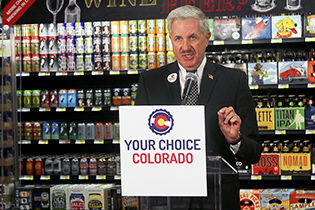Wars brewing again over allowing grocery stores to sell full-strength wine and beer

Supporters of an effort to allow grocery store sales of full-strength beer and wine are taking another shot at persuading voters or the Colorado General Assembly to change the state’s post-Prohibition laws.
An organization called Your Choice Colorado launched the first salvo Tuesday, announcing a campaign to change the law. The next day, an organization called Keep Colorado Local, representing mom-and-pop liquor stores and craft breweries, fired back.

Colorado ranks third in the nation in the number of breweries per capita, yet Coloradans can’t buy many of those craft beer products in local grocery stores, according to Tyler Sandberg, a spokesman for the Your Choice Colorado campaign.
The poster child for the full-strength campaign is the King Soopers store in Glendale. It’s the only King Soopers in the state allowed to sell full-strength beer and wine. Grocery stores want craft beers because that’s what consumers want, Sandberg said. For example, there’s a Colorado Springs brewery that sells more beer at that Glendale King Soopers than in any other store in the state, including liquor stores, he said.
Sandberg dismisses concerns that grocery stores would only sell the biggest and best-selling craft beers and wines, which liquor store owners say will hurt their businesses. Colorado grocery stores have already demonstrated their support for local products, such as selling Palisade peaches, Olathe sweet corn and Rocky Ford cantaloupe, Sandberg pointed out.
For example, Sandberg said, the liquor buyer at the Glendale King Soopers recently sampled a craft beer at a bar, liked it and ordered it for his store. And having a grocery store sell full-strength beer hasn’t lessened the number of liquor stores in Glendale, Sandberg said, noting that there 79 liquor stores within two miles of the King Soopers and a nearby Target that also sells full-strength brews.
He acknowledged the expertise of liquor store employees, conceding that they will retain that expertise for those customers who want recommendations for a good bottle of wine or a new beer to try. That’s going to be their competitive advantage, Sandberg said.
The growth of craft breweries in Colorado has led to a shortage of shelf space at liquor stores, he said. That’s forced some, including small breweries, to sell out of state because they simply can’t find the shelf space in Colorado.
Finally, Sandberg said, the two states that rival Colorado for the most craft breweries per capita, Oregon and Vermont, already allow full-strength sales in their grocery and convenience stores.
Representing 1,600 “mom-and-pop liquor stores” and more than 400 independent craft brewers, the Keep Colorado Local coalition isn’t buying it. They claim retail giants King Soopers, Safeway and Walmart will spend millions of dollars to change Colorado law in favor of the grocery stores.
Carolyn Joy, owner of Joy’s Wine and Spirits in Denver, said Wednesday that liquor stores support craft breweries, distilleries and other producers, and they in turn are supporting the effort to keep the law as it is.
Her store sells more than 400 kinds of beer and 1,000 kinds of wine, some from very small vendors, Joy said. She contended that a corporate buyer doesn’t have the time to look at that many products, including the more unique products. “Their job is to make money,” she said, not to offer consumers big selections.
Liquor stores maintain their profits by stocking a broad selection, from the specialized to the mass-market products, she said.
Were the law to change, she would likely have to let some of her 11 employees go, Joy said, because customers will be buying beer and wine at grocery stores. “How would you like 20 or 30 percent of your paycheck to disappear?” she asked. “The impact will be felt.”
In Washington state, Joy pointed out, where the law was recently changed to sell beer and wine in grocery stores, the legislature commissioned a study to review the impact. Prices went up, underage residents were more likely to try buying alcohol and shoplifting went up, she said.
Joy said she’d rather spend her time on something more productive than battling grocery store chains in a fight that has been going on for decades. She noted that her father, who founded the liquor store, faced similar struggles over the years.
She also maintained that the effort to change the law is largely coming from out-of-state corporations. Only 14 cents of every dollar in sales at those grocery stores stays in Colorado, she said, whereas, in her business, 50 cents of every dollar stays in Colorado.
Your Choice Colorado has two options: to ask the Legislature for the authority or to go to voters. A 2016 ballot measure is a backup solution, Sandberg said. In the meantime, supporters are out at fairs, festivals and Broncos game, urging residents to call their legislators. For now, the effort is focused on grocery stores. The group hasn’t yet decided whether a ballot measure would include other retailers, such as convenience stores, as has been part of the effort in the past, he said.
In previous appearances before the General Assembly, the question has drawn strong support and equally strong opposition from both sides of the aisle.
The Legislature has tried at least four times in the past decade to change the law. The closest a bill ever came to approval was in 2011, when Reps. Larry Liston, R-Colorado Springs, and Crisanta Duran, D-Denver, sponsored House Bill 11-1284. The bill made it out of a committee Liston chaired and onto the House floor. But it died on second reading, despite efforts to amend it to appease liquor stores and craft breweries, such as limiting sales in grocery stores to products with 11 percent alcohol content or less. Senate President Bill Cadman, R-Colorado Springs, was the bill’s Senate sponsor.
The most recent attempt was in 2013, but that bill, sponsored by Rep. Kevin Priola, R-Henderson, was killed at his request before its first hearing.
Priola told The Colorado Statesman this week he has talked with representatives of the grocery stores but told them he would take another shot at it only if they come up with a “kumbayah” kind of bill that doesn’t draw the same kind of opposition it got in 2013.
“It’s for consumer benefit,” Priola said. People can shop at grocery stores for some beers and wines and shop at liquor stores for others, he added.
Should a bill surface at the Capitol next session, Sen. Chris Holbert, R-Parker, is likely to be one of its strongest opponents.
Holbert maintained in an interview with The Statesman this week that the liquor industry is highly regulated, and to allow grocery stores to sell full-strength beer and wine would require a certain amount of deregulation.
Take the issue of selling to underage customers, he said, pointing out that when a liquor store sells to a minor, the repercussions can range from fines to being shut down. Would the public accept closing down a grocery store for selling to minors? Probably not, Holbert said.
Grocery store owners might maintain they have the same kind of security that liquor stores have, he added, but many grocery stores have wide-open entrances or doors that stay open all day. That creates opportunity for shoplifting, a situation he said he witnessed this past summer when a group of teens stole a grocery cart full of beer. Grocery store personnel gave chase and the teens took off without the beer, Holbert added.
Then there’s the issue of licenses, which is at the heart of the regulatory structure. Any business that sells full strength beer and wine is limited to one license. That’s been in the law since just after Prohibition ended. However, to allow grocery store chains to sell full strength beer and wine, they would have to get multiple licenses for multiple locations, which Holbert says isn’t equitable.
Grocery stores can already sell full-strength beer and wine, Holbert points out. It’s just that they’re limited to one location per chain, which is why King Soopers and Target in Glendale are allowed to sell full-strength beverages.
Is there a compromise out there?
Holbert doesn’t think so. The issue has been thoroughly vetted, he said, adding that he doesn’t see a shift among lawmakers toward supporting another shot at it. Neither, he said, is it the business of the Legislature to pick winners and losers, repeating mistakes made with the post-Prohibition laws.
“I don’t want the force of government to create an artificial change,” he said. “That’s the wrong use of the power of government.”
– marianne@coloradostatesman.com














